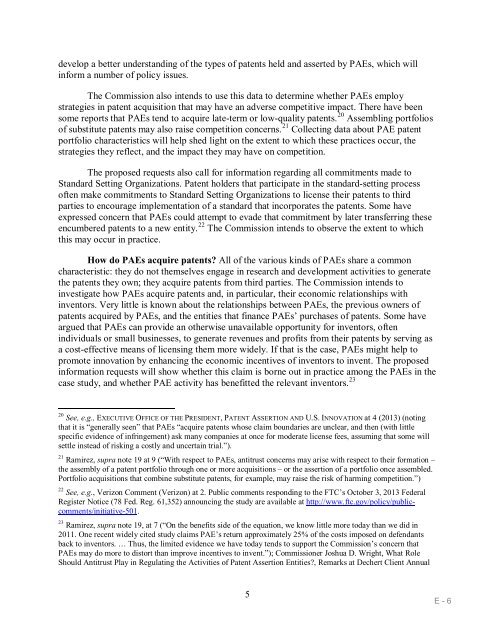Create successful ePaper yourself
Turn your PDF publications into a flip-book with our unique Google optimized e-Paper software.
develop a better understanding of the types of patents held and asserted by PAEs, which will<br />
inform a number of policy issues.<br />
The Commission also intends to use this data to determine whether PAEs employ<br />
strategies in patent acquisition that may have an adverse competitive impact. There have been<br />
some reports that PAEs tend to acquire late-term or low-quality patents. 20 Assembling portfolios<br />
of substitute patents may also raise competition concerns. 21 Collecting data about PAE patent<br />
portfolio characteristics will help shed light on the extent to which these practices occur, the<br />
strategies they reflect, and the impact they may have on competition.<br />
The proposed requests also call for information regarding all commitments made to<br />
Standard Setting Organizations. <strong>Patent</strong> holders that participate in the standard-setting process<br />
often make commitments to Standard Setting Organizations to license their patents to third<br />
parties to encourage implementation of a standard that incorporates the patents. Some have<br />
expressed concern that PAEs could attempt to evade that commitment by later transferring these<br />
encumbered patents to a new entity. 22 The Commission intends to observe the extent to which<br />
this may occur in practice.<br />
How do PAEs acquire patents? All of the various kinds of PAEs share a common<br />
characteristic: they do not themselves engage in research and development activities to generate<br />
the patents they own; they acquire patents from third parties. The Commission intends to<br />
investigate how PAEs acquire patents and, in particular, their economic relationships with<br />
inventors. Very little is known about the relationships between PAEs, the previous owners of<br />
patents acquired by PAEs, and the entities that finance PAEs’ purchases of patents. Some have<br />
argued that PAEs can provide an otherwise unavailable opportunity for inventors, often<br />
individuals or small businesses, to generate revenues and profits from their patents by serving as<br />
a cost-effective means of licensing them more widely. If that is the case, PAEs might help to<br />
promote innovation by enhancing the economic incentives of inventors to invent. The proposed<br />
information requests will show whether this claim is borne out in practice among the PAEs in the<br />
case study, and whether PAE activity has benefitted the relevant inventors. 23<br />
20<br />
See, e.g., EXECUTIVE OFFICE OF THE PRESIDENT, PATENT ASSERTION AND U.S. INNOVATION at 4 (2013) (noting<br />
that it is “generally seen” that PAEs “acquire patents whose claim boundaries are unclear, and then (with little<br />
specific evidence of infringement) ask many companies at once for moderate license fees, assuming that some will<br />
settle instead of risking a costly and uncertain trial.”).<br />
21<br />
Ramirez, supra note 19 at 9 (“With respect to PAEs, antitrust concerns may arise with respect to their formation –<br />
the assembly of a patent portfolio through one or more acquisitions – or the assertion of a portfolio once assembled.<br />
Portfolio acquisitions that combine substitute patents, for example, may raise the risk of harming competition.”)<br />
22<br />
See, e.g., Verizon Comment (Verizon) at 2. Public comments responding to the FTC’s October 3, 2013 Federal<br />
Register Notice (78 Fed. Reg. 61,352) announcing the study are available at http://www.ftc.gov/policy/publiccomments/initiative-501.<br />
23<br />
Ramirez, supra note 19, at 7 (“On the benefits side of the equation, we know little more today than we did in<br />
2011. One recent widely cited study claims PAE’s return approximately 25% of the costs imposed on defendants<br />
back to inventors. … Thus, the limited evidence we have today tends to support the Commission’s concern that<br />
PAEs may do more to distort than improve incentives to invent.”); Commissioner Joshua D. Wright, What Role<br />
Should Antitrust Play in Regulating the Activities of <strong>Patent</strong> <strong>Assertion</strong> Entities?, Remarks at Dechert Client Annual<br />
5 <br />
E - 6


